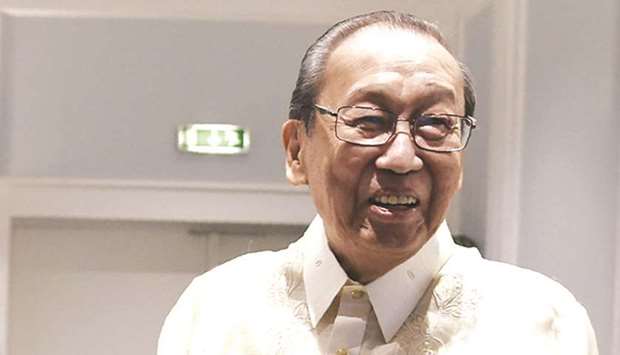The Philippine government is seeking to revoke the political refugee status of exiled Communist Party of the Philippines (CPP) founder Jose Maria “Joma” Sison by tapping the European Union (EU) for help, Interior Secretary Eduardo Ano said yesterday.
The move came as Sison, his wife Juliet and 36 others were ordered arrested by the Manila City Regional Trial Court Branch 32 over an alleged massacre in Inopacan, Leyte during the 1980s. No bail was recommended.The communist leader, who is on self-exile with his wife in Utrecht, The Netherlands, has called the murder charges against him and his co-accused as “fake.”
Ano, however, said he already talked with the EU about the possible revocation of Sison’s status as political refugee in The Netherlands, a member-state of the union.
“We are seeking to revoke the refugee status of Joma Sison so we can extradite him here to the Philippines and (for him) to answer all his cases. This is a wonderful development so he can be put back to jail,” he added.
He said officials of the EU Embassy in Manila gave assurances that they were willing to assist Manila on its appeal for assistance.
Ano also said in an interview over DZBB radio that he already discussed the matter with Defence Secretary Delfin Lorenzana, Armed Forces chief Gen. Benjamin Madrigal Jr and Philippine National Police chief Oscar Albayalde.
The four of them, he added, agreed that a joint team of military and police should be formed to track down the accused individuals indicated in the warrant of arrest issued by the court. On Friday, the Armed Forces of the Philippines committed to exert its efforts to have Sison and the others nabbed by co-ordinating with the International Police to effectively enforce the arrest order on those outside the Philippines.
In an interview on Saturday night over an online radio, Sison said he cannot be arrested by Philippine authorities since Manila and Amsterdam did not have an extradition treaty.
The Philippines only has extradition treaties with Australia, Canada, China, Hong Kong, India, Indonesia, Spain, Thailand, South Korea, Switzerland, the United Kingdom and the United States.
“There is no extradition treaty existing between The Netherlands and the Philippines, and I have rights as a recognised political refugee under the Geneva Refugee Convention (1951 Refugee Convention) and the European Convention on Human Rights,” Sison explained.
Sison again maintained his innocence over the Inopacan massacre, saying from the time it happened, he was already placed under maximum security detention in 1985, which would have disabled him to make orders to the CPP and its armed wing, the New People’s Army (NPA).
He, however, admitted that there were NPA cadres who steered into the “wrong line of militarism” during the timeline of the massacre, making the CPP realise in 1992 to “straighten” the wrongdoings of those rebels over their crimes. Sison blamed President Rodrigo Duterte for the arrest order issued against him and the others.
“It’s true that Duterte has raged against me because I often criticise his wrong policies and moves. He obviously wants to scare off those who are opposed to his ideas,” he said.

Jose Maria Sison: under scrutiny
